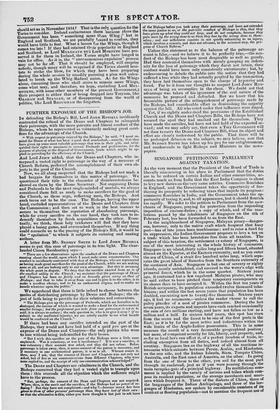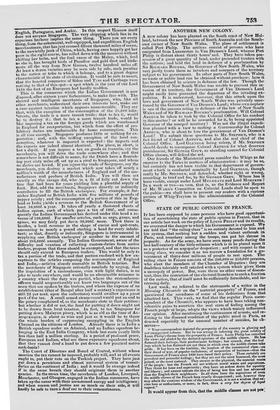SINGAPORE PETITIONING PARLIAMENT AGAINST TAXATION.
AT the very moment that the President of the Board of Trade is liberally announcing in his place in Parliament that the duties are to be reduced on certain Indian and other commolities, ac- counts reach us from India that the East India Company is about to levy new duties on the very same articles. Commerce flourishes in England, and the Government takes the opportunity of fur- thering its prosperity by reducing taxes that impede its progress: commerce flourishes in India, and the Government takes the op- portunity of taxing it, and, to all appearance, lest it should flourish too rapidly. We refer to the petition to Parliament from the mer- chants of Singapore, praying for protection from the impending imposition of custom-duties ; a copy of which, and of the reso- lutions passed by the inhabitants of Singapore on the 4th of February last, has been forwarded to us from the East. In the neighbourhood of Singapore, Malayan piracy—danger- ous, however, only to the native craft which frequent that busy port—has of late years been troublesome; and to raise a fund for its suppression, the Indian Government proposes to levy a tax on a trade which has been heretofore free from all taxation. The
subject of this taxation, the settlement or colony of Singapore, is one of the most interesting in the whole history of commerce. Singapore is an island, thirty miles long and fifteen broad, situated almost on the Equator, at the Eastern extremity, and as you enter the sea of China, of a strait five hundred miles long, which sepa- rates the great island of Sumatra from the Southern extremity of the continent of Asia. Singapore is but one of seventy or eighty islands, mostly uninhabited, and covered to the water's edge with primeval forest, which lie in the same quarter. Sixteen years ago, it contained but a few vagabond Malayan pirates, who may be said rather to have pitched their temporary encampments on its shores than to have occupied it. Within the first ten years of British occupancy, its population exceeded twelve thousand inha- bitants; and within the last seven years that population has been doubled, amounting now to twenty-five thousand. Sixteen years ago, it had no commerce,—unless the reader choose to call the paltry plunder of a nest of pirates commerce. During the last seven years, its exports and imports have each reached occasionally the sum of two millions sterling, and have not fallen so low as a million and a half. In sixteen brief years, this spot has risen from the ocean and the forest to be one of the first ports in the East; as it is by far the most active and industrious within the wide limits of the Anglo-Indian possessions. This is in some measure the result of a very favourable geographical position; but more, of competent security for life, liberty, and property, and, as far as local laws can effect it, of a perfect freedom of trade, in- cluding exemption from all duties, and indeed almost from all scrutiny. Singapore lies on the highway of all the maritime in- tercourse which subsists between Persia, Arabia, and Hindostan, on the one side, and the Indian Islands, Siam, Tonquin China, Australia, and the East coast of America, on the other. In going from the one of these to the other, you sail for the most part through its roadstead, just as if you were passing through the main turnpike-gate of a principal highway. Its multifarious com- merce is implied by the variety of nations and tribes which com- pose its resident population, or the strange merchants and mari- ners which frequent it. Three of the dialects of China, three of the languages of the Indian Archipelago, and three of the lan- guages of Hindostan, are spoken by considerable numbers of its resident or floating population—not to mention the frequent use of
English, Portuguese, and Arabic. In this respect Moscow itself does not surpass Singapore. The very shipping which lies in its capacious harbour implies the same thing. There you see every thing, from the substantial, well-equipped, and expeditious English merchantman, that has just crossed fifteen thousand miles of ocean, to the unwieldly junk of China, which, having once happily got her prow in the right course, has rolled down with the monsoon without shifting her helm, and the frail canoe of the Malay, which, frail as she is, has brought birds of Paradise and gold dust and birds- nests all the way from New Guinea, twelve hundred miles off. At least a dozen varieties may be seen side by side, each peculiar to the nation or tribe to which it belongs, and to a great degree characteristic of its state of civilization. It would be safe to assert, that the boasted commerce of Sidon and Tyre and Carthage were nothing to that of this spot—a spot which in the year of our Lord 1818 the foot of an European had hardly trodden.
This is the commerce which the Indian Government is now disposed, after sixteen years' forbearanee, to make free with. The shrewd and intelligent merchants of Singapore, who, like all other merchants, understand their own interests best, make out a case against taxation which appears unanswerable. They say that, with the exception of the consumption of the 25,000 Mho- })itants, the trade is a mere transit trade; that to tax it, would be to destroy it ; that to tax a mere transit trade, would be like imposing a tax on the foreign goods which are warehoused in England for reexportation, but which from the effect of pro- hibitory duties are inadmissible for home consumption. This is all true enough. Singapore produces little or nothing for ex- portation; and, with the trifling exception of the local con- sumption, whatever is imported is exported : the imports and the exports are indeed almost identical. The place, in short, is but a dep6t. If you impose a tax on goods in transitu, say the merchants, you will drive the trade somewhere else; and that somewhere is not difficult to name, for the Dutch have a flourish- ing port sixty miles off, set up as a rival to Singapore, and where no duties are levied. If you injure the trade of Singapore, say the merchants, you destroy a market which now takes off nearly a million's worth of' the manufactures of England and of the ma- nufactures and produce of British India. You will then act exactly as the savage did, who in a fit of folly cut down the tree that had been for years yielding him a plentiful supply of fruit. But, add the merchants, Singapore directly or indirectly contributes to fill the British exchequer. For example, it fur- nishes England or British India with five millions of pounds of pepper yearly; and the consumption of a portion of this in Eng- land or India yields a revenue to the British Government of at least 50,000/. a year. It takes off yearly a thousand chests of Indian opium, each of which pays a tax of 100/., and conse- quently the Indian Government has derived under this head a re- venue of 100,000/. For smaller articles, such as sago, gums, and spices, we may fairly put down 30,000/. more. Then there is besides, a local revenue in the shape of excise and quit-rents, amounting to nearly a pound sterling a head for every inhabi- tant; so that, directly or indirectly, Singapore is instrumental in supplying one British exchequer or another to the amount of about 200,000/. annually. The Indian Government, aware of the difficulty and vexation of collecting custom-duties from native traders, propose that these should be exempted, and that the taxes should only extend to European traders. This would be only to tax a portion of the trade, and that portion confined with few ex- ceptions to the articles composing the consumption of' England and India,—articles already amenable to British taxation. But the merchants of Singapore rationally conclude by urging, that the inquisition of a customhouse, even with light duties, is no joke to trade anywhere, and would be an abominable nuisance in a country where the duty was partial, where the customhouse- officers would unquestionably not know two languages out of the score that are spoken by the traders, and where the expense of an establishment (that of Bengal after half a century's experience is still 22 per cent, upon the collections) would swallow up a great pal t of the tax. A small armed steam-vessel would put an end to the piracy complained of, as the merchants state in their petition; but whether it did or not, the fund for putting it down ought not to he drawn from local taxation. In fact, to tax Singapore for putting down Malayan piracy, which is as old as the time of AL- BUQUERQUE, is about as wise and just as it would be to throw the whole burden of suppressing smuggling in the English Channel On the citizens of London. Already there is in India a British squadron under an Admiral, and an Indian squadron be- longing to the East India Company, which last costs yearly little less than half a million sterling. In a period of profound peace, European and Indian, what are these expensive squadrons about, that they cannot lend a hand to put down a few piratical native cock-boats?
The Court of Directors and Board of Control, without whose sanction the tax cannot be imposed, probably will, and at all events ought to, put their veto on the Turkish project. They have just put down a pernicious and almost universal system of transit- duties on the continent of India ; and it would be strange indeed if in the same breath they should originate them in another quarter. In the mean time, the merchants of London, Liverpool, Manchester, and Glasgow, engaged in the Indian commerce, have taken up the cause with their accustomed energy and intelligence; and when reason and justice are so much on their side, it will hardly be safe to turn a deaf ear to their remonstrances.



























 Previous page
Previous page